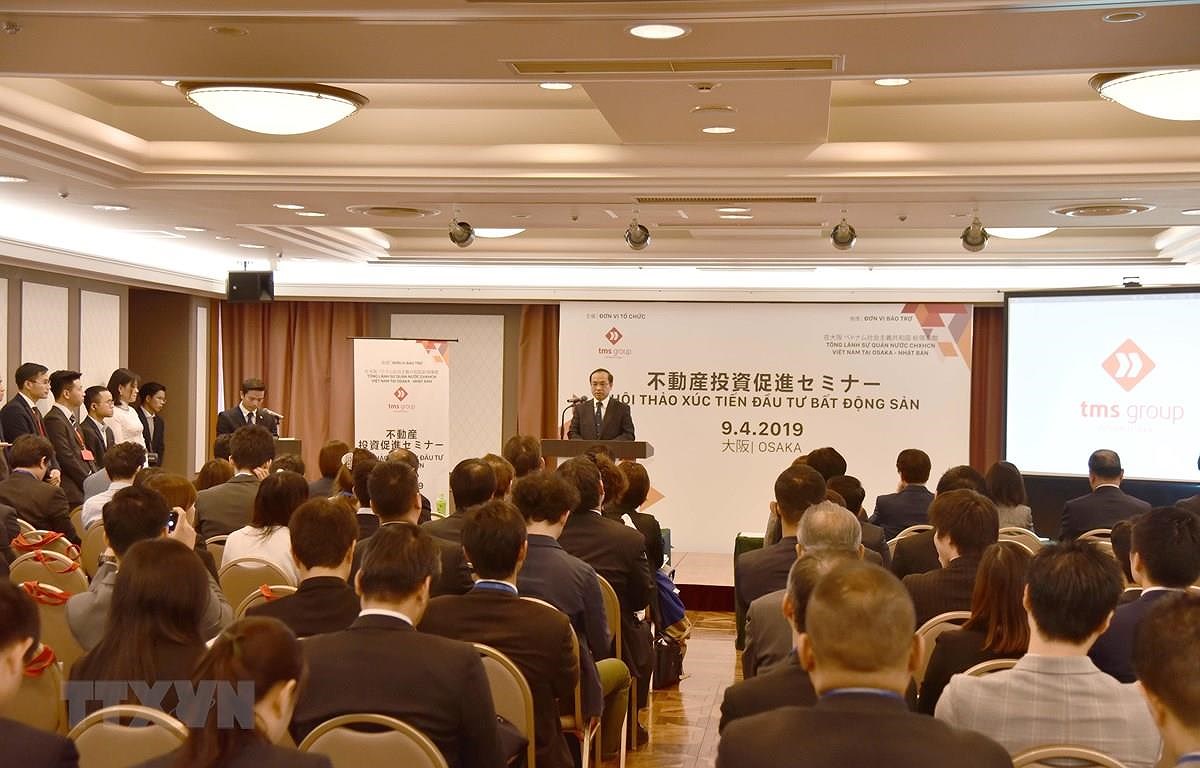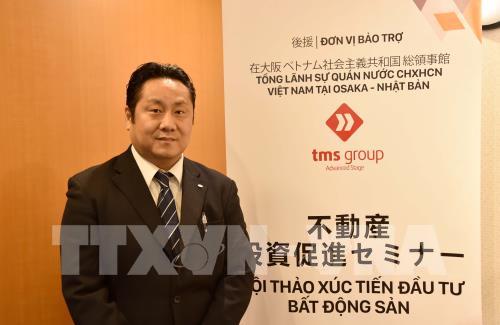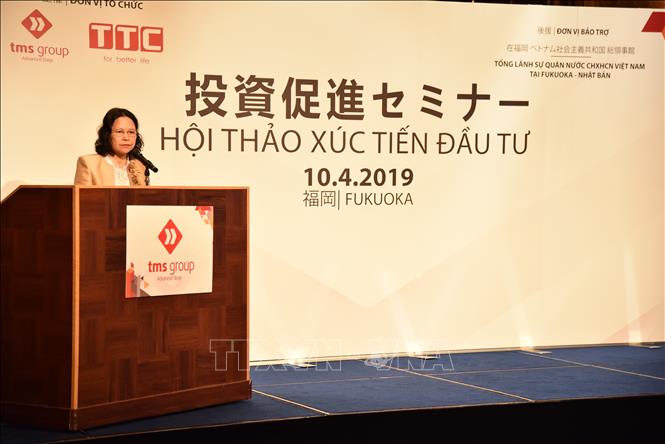
At the investment promotion workshop in Osaka. (Photo: VNA)
Vietnam in the eye of Japanese investors
Japanese investors, after years of working with different markets, have concluded that the real estate market in Vietnam appears to be most attractive in Southeast Asia.
In an interview with correspondents from the Vietnam News Agency on the sidelines of the TMS Group’s investment promotion workshop in Osaka on April 9, Nakata said that it is not just Vietnam’s real estate market, but those in some Asian countries like Cambodia, Indonesia also have good prospects.
However, he believed that Vietnam is the most attractive due to its safe and stable investment environment. Some 10 years ago, he started doing business in the Southeast Asian nation, which is now home to many high-rise buildings. Real estate has turned to be the most-chosen investment channel in Vietnam as foreign investors see their significant returns on the money they will invest, Nakata said.
Sharing the same view, Kako Sasai, head of the business information division of the Japan External Trade Organization (JETRO), predicted that foreign investment in Vietnam’s realty sector would increase in the years ahead.
Showing evidence for the statement, the expert said that the number of Japanese companies investing in Vietnam’s real estate sector has been on the rise, especially between 2016 and 2018. Growing demand for offices and houses has been the main reason, she said.
It is obvious that Vietnam has witnessed a rapid urbanization rate over the past years, ranking it the leading nation in Southeast Asia for the fastest urbanization rate, the Kinh Te & Do Thi newspaper reported.
As of May 2018, Vietnam was home to 813 urban areas, including economic zones, and industrial parks.
Most of Japanese investors in Vietnam evaluated that the country has lots of potential and brings stable profits, Kako Sasai emphasized.
The Vietnamese Government and enterprises have been focusing on attracting more overseas firms to invest in Vietnam beyond the field of real estate, she added.
Once major projects in Vietnam’s north-central region and some key highway projects are put into operation, they will act as a catalyst for Japanese investors, she added.
According to the latest survey of JETRO, Japan’s direct investment in Vietnam has increased in terms of the number of businesses and the amount of capital. As many as 70 percent of Japanese businesses plan to expand operations in Vietnam, while 88 percent expect their revenues in the market will increase in the future.
The Vietnamese Government and enterprises are paying greater attention to encouraging more overseas firms to set up shop in Vietnam, beyond the real estate sector, according to Sasai.
Meanwhile, other Japanese experts attributed the attractive real estate market to the growing number of people at working ages. It would be the consumers in the near future, they said.
Toru Tomita, director general at the Osaka-based O.M.NET cooperative business association, described Vietnam as a young nation with abundant labour supplies. In the future, more Japanese businesses will come to invest in Vietnam, he said.
The investment promotion workshop in Osaka is part of activities of the TMS Group to introduce the investment environment in Vietnam and seek potential partners in real estate projects that the group is implementing in Vietnam.
Vietnamese Consul General in Osaka Vu Tuan Hai confirmed that the Vietnamese Government is committed to creating an open, fair and favorable business environment for Japanese investors.
The Vietnamese Consulate General will continue supporting and accompanying Japanese businesses in studying, preparing and implementing business investment plans in Vietnam, he said.
With such a spirit, the Vietnamese government has been focusing on attracting more foreign investors and overseas Vietnamese to invest in the country beyond the field of real estate.
TMS Group has been cooperating with Japanese partners over the past 15 years and it has been serving as a bridge to connect Vietnamese businesses with Japanese partners in the fields of their strengths such as real estate, human resources supply, education-training, trade, services, healthcare, and high-tech agriculture.

Yoshinori Nakata, director of Japan’s Global Link Cooperative. (Photo: VNA)
Figures speak
Foreign investors were reported to pour roughly US$6.6 billion into Vietnam’s real estate sector in 2018, doubling year-on-year, statistics by the Ministry of Planning and Investment showed.
The figure ranked real estate the second most invested sector, only behind manufacturing in Vietnam.
According to the Ho Chi Minh City Real Estate Association (HoREA), FDI to real estate topped foreign investors’ investment portfolios in Hanoi and ranked second in the southern metropolis of Ho Chi Minh City.
Head of HoREA Le Hoang Chau said that Japanese and South Koreans top foreign investors in Vietnam's real estate sector.
More importantly, the foreign developers bring premier segment and services with luxury architecture and lifestyle, drawing a large number of foreign homebuyers, Chau said, adding that the operations of foreign investors also boost the market transparency.
The development of real estate market has lifted up the luxury office segment in big cities, mostly Ho Chi Minh City, with the occupancy rate of 96% for Grade A and more than 90% for Grade B.
Vietnam’s real estate market would continue its upward trend in 2019 thanks to rising FDI, the prospects of the signing of the EU-Vietnam Free Trade Agreement (EVFTA), and the US-China trade conflicts, Chau noted.

Vietnamese Consul General to Fukuoka Nguyen Phuong Hong addresses the investment promotion workshop on April 10. (Photo: VNA)
More getting-to-know-each-other needed
Sumio Hara, Chairman and General Director of the So Kikaku Sekkei construction design company, told the Vietnam News Agency that to Japanese people, Vietnam is a leading investment destination in Southeast Asia. However, he hasn’t known much about the property market in Vietnam.
If more detailed information about the market is provided like through this workshop, the Vietnamese market will possibly become the top destination for Japanese property investors, he stressed.
Addressing the event, Vietnamese Consul General to Fukuoka Nguyen Phuong Hong said her office is ready to support enterprises in the Kyushu region, in which the prefecture is located, who are interested in investment and business chances in Vietnam.
She cited the results of a recent survey conducted by the Japan External Trade Organisation (JETRO) as finding that 70 percent of Japanese firms in Vietnam intend to expand their business activities, a relatively high rate compared to those in other countries. Meanwhile, in a poll by the European Chamber of Commerce in Vietnam (EuroCham Vietnam), 90 percent of the companies interviewed rated Vietnam’s economic outlook as stable and improving.
Hong said enterprises’ optimism about their business prospect in Vietnam and the Vietnamese economy’s rapid growth are the main factors attracting foreign investors’ attention to the local real estate market.
The workshop in Fukuoka was among a series of events held by TMS Group in Japan to introduce Vietnam’s investment climate and seek potential partners for this firm’s property projects in Vietnam.
Vice Chairman of the TMS Group Vu Van Trung said nearly 500 investors, including many major ones, took part in three workshops organised in Tokyo, Osaka and Fukuoka from April 8 to 10. They expressed their interest in his firm’s projects in real estate, health care, agriculture and education.
TMS Group, founded in 2004, operates in property, human resources supply, education-training, trading services, healthcare and hi-tech agriculture, with property being its core business.


















